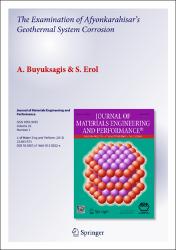The examination of Afyonkarahisar's geothermal system corrosion
Citation
Büyüksağiş, Aysel & Erol, Sinem; The Examination of Afyonkarahisar’s Jeothermal System Corrosion”, Journal of Materials Engineering and Performance,2013, Vol.22, pp:563-573Abstract
Corrosion and scaling of metal surfaces are the major problems caused by geothermal fluids when metallic structures are used. This article describes a study of corrosion and scaling problems in the Afyonkarahisar Geothermal Heating System (AFJET) in Afyonkarahisar, Turkey. Water analysis, XRD, SEM, EDX, IC, ICP-OES analyses, and electrochemical methods were used in this study. Pentasodium triphosphate (Na5P3O10), maleic anhydride (C4H2O3), and 1,3-benzendisulfonic acid disodium salt (C6H4Na2O6S2) were used as corrosion inhibitors. Tests were carried out using geothermal water from AF11 well. The experimental temperatures were chosen as 298, 333, and 358 K. Inhibitor concentrations were chosen as 131021, 131022, 131023, and 131024 mol/dm3. Moreover, mixed inhibitor solutions were prepared using the inhibitor concentrations that showed the best inhibition. The first mixed inhibitor solution showed 96% inhibition. The second mixed inhibitor solution showed 90% inhibition. The tested inhibitors act as anodic inhibitors. XRD analysis shows that there is CaCO3 aragonite scaling in the system. Increasing TDS, alkalinity, and hardness all promote scale formation. The photomicrographs from SEM-EDX and the metallographic microscope show that the tested inhibitors form a protective film on the surface. IC and ICP-OES analyses show that the concentration of Ca2+ is very high, which supports scale formation.



















